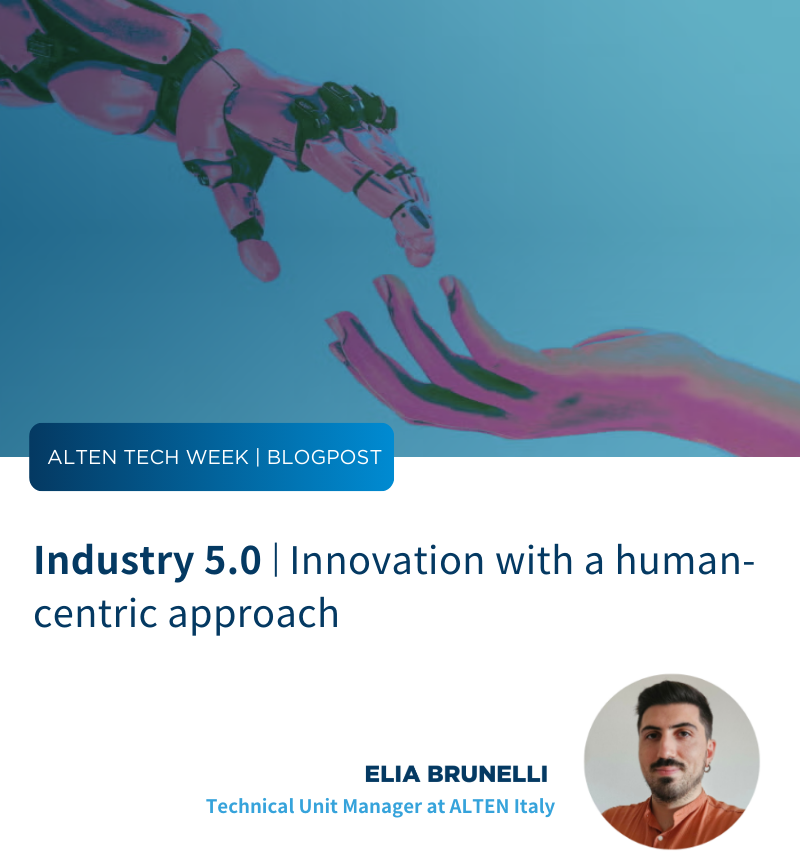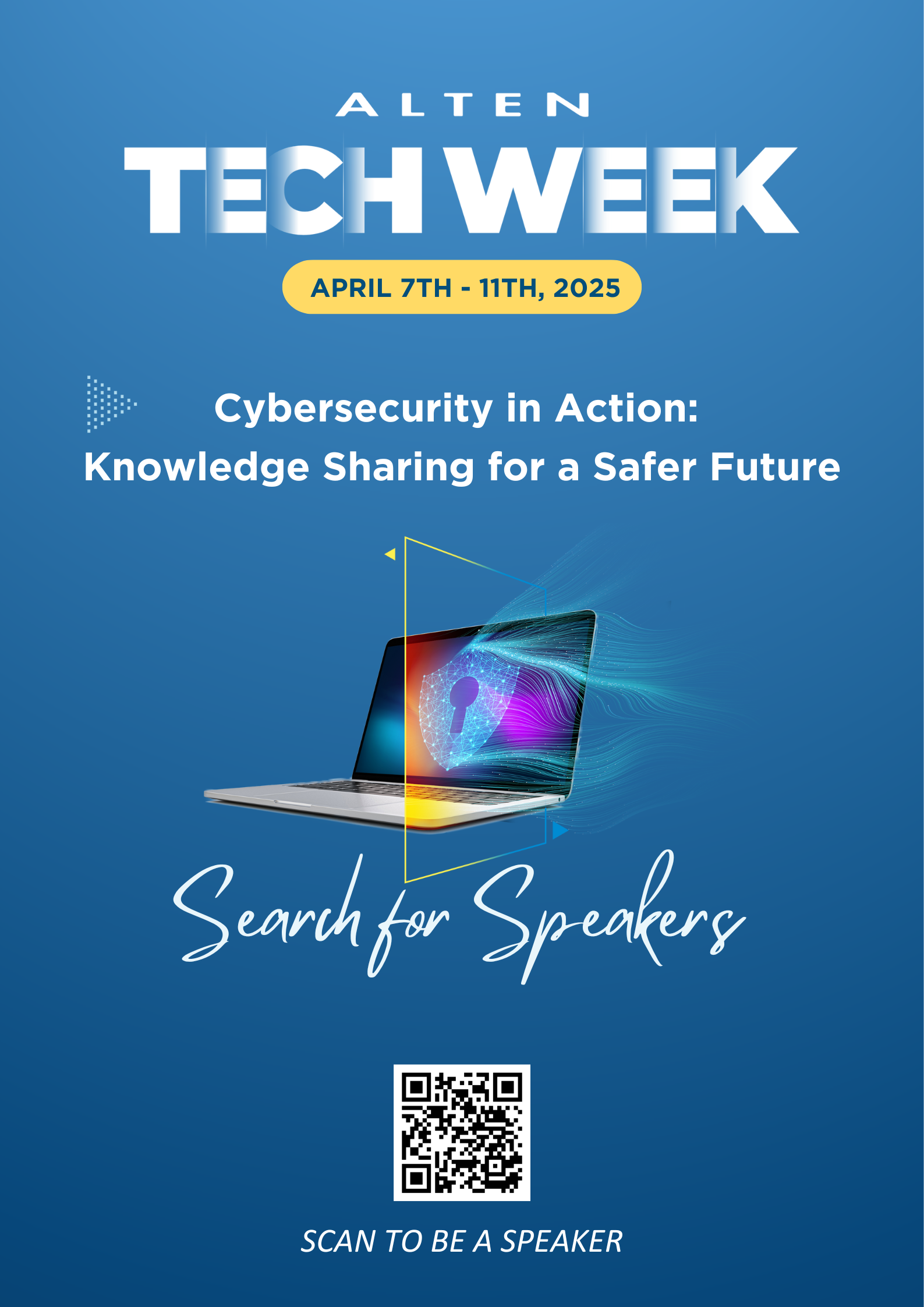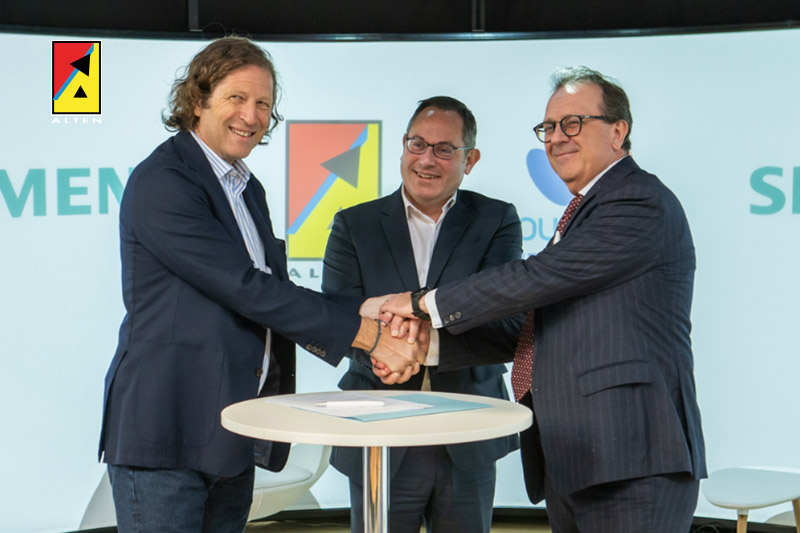


This past November 25th to 29th, 2024, ALTEN hosted its second edition of International Tech Week, featuring a program of 7 unique webinars on the given theme: Automation Across Borders. One standout session was “Industry 5.0 | Innovation with a human-centric approach”, delivered by Elia Brunelle, a Technical Unit Manager at ALTEN Italy.
The core of Elia’s comprehensive talk was Industry 5.0, where he highlighted its key principles, fundamentals, and enabling technologies, and focused on how this new approach impacts industry landscapes, workers, and solution providers. Now, let’s delve into the key points and insights that were covered.
Understanding Industrial Revolutions
Industrial revolutions are not merely technological milestones; they are transformative periods reshaping economies, societies, and the way we live. We recognize that these revolutions arise from the interplay between technological advancements and evolving social and economic demands. Each industrial revolution has profoundly altered how we produce goods, organize labor, and interact.
18th century
The First Industrial Revolution
- Marked by the mechanization of work and the introduction of the steam engine.
- Revolutionized manufacturing and transportation industries.
19th century
The Second Industrial Revolution
- Driven by electricity, enabling mass production and assembly line efficiency.
- This era cultivated consumer culture and shaped the modern economy.
Mid-20th century
The Third Industrial Revolution
- Introduced automation, electronics, and computing to industrial processes.
- Enhanced precision, efficiency, and control in manufacturing.
Industry 4.0 (Early 21st century)
The Fourth Industrial Revolution
- Born with digitalization at its core.
- Encompasses cyber-physical systems, IoT, AI, and real-time data-driven decision-making.
- Industry 4.0 improved production flexibility through modular processes and virtual representations of physical systems.
While the first two industrial revolutions revolved around scalable efficiency above all, the third and fourth shifted their focus towards scalable adaptability. We can also clearly observe a pattern where the gaps between revolutions grow smaller than the previous, highlighting the acceleration in the advancement of technology.
As fruitful as Industry 4.0 has proven to be, this industrial revolution remains a technological paradigm. It has not considered the contemporary context we live in and its major social, environmental, and economic challenges. Technology can be cold.
The Emergence of Industry 5.0
Since 2021, the EU has been firmly pushing for a new vision, one that embraces a shift within our industrial, societal, and economic contexts. This new vision is called Industry 5.0, representing a paradigm shift that extends beyond just technology. This evolution complements Industry 4.0 by emphasizing human-centric, sustainable, and resilient approaches to industrial innovation. Here are the key takeaways:
01 A human-centric vision
- Technology adapts to human needs, not vice versa.
- Machines are collaborative partners, enhancing human creativity rather than replacing it.
Industry 5.0 safeguards workers’ rights, such as privacy, autonomy, and dignity.
02 Sustainability at the core
- Industries must adopt circular processes to reuse resources, minimize waste, and reduce environmental impact.
- Technologies, like AI and additive manufacturing, are leveraged for resource efficiency.
03 Building resilience
- Focus now placed on robust industrial systems that can withstand disruptions, such as global crises.
- Emphasises adaptable production capacities and secure value chains.
Ultimately, Industry 5.0 is not a revolution. “It is an evolution that complements and develops the essential features of Industry 4.0, introducing the environmental and social dimension. It gives a soul to the cold technological paradigm of Industry 4.0.” Several key drivers and characteristics define this very evolution:
Human-machine collaboration:
A symbiotic relationship that enhances human creativity and decision-making. “Machines are no longer only performers, but collaborative partners that amplify and empower the capabilities of individuals, rather than replace them.”
Ethical and sustainable practices:
The synergy between humans and machines within Industry 5.0 fosters an industrial landscape where sustainable and ethical considerations are not just goals but foundational principles. “Technologies, like AI and additive manufacturing, can play a large role here, by optimizing resource efficiency and minimizing waste.”
Digital transformation:
Empowering technology to address societal challenges. “Geopolitical shifts and natural crises, such as the Covid-19 pandemic, highlight the fragility of our current approach to globalized production. Resilient strategic value chains, adaptable production capacity, and flexible business processes must be developed, especially where value chains serve basic human needs, such as healthcare or security.”
Workforce empowerment:
Elevating the role of workers as central to innovation. The worker is no longer considered as a “cost”, but as a key player in the innovation process of a company. They are directly involved in the design and deployment of new industrial technologies.
Shaping the Future Workforce
The workforce of Industry 5.0 reflects a new vision where human capabilities are augmented by technology:
01 New Roles
Operators whose capabilities are not merely replaced with autonomous systems, but rather extended with innovative technological means, enhancing their abilities (e.g. augmented operators, virtual operators, healthy operators, etc.).
Emerging specialists, such as Cobotics System Experts, User Experience Designers, AI Trainers & Ethicists, or Green Technology Innovators.
02 Skills Evolution
A mix of hard and soft skills, with emotional intelligence and adaptability as cornerstones.
Continuous learning is essential to navigate rapid technological changes (e.g. as new technologies are introduced, simultaneously carrying out trainings to learn and understand how to work with and apply them).
To address this new typology of workers, the skills dimension is an important set of considerations for Industry 5.0. The World Economic Forum has stated that by 2025, 50% of all employees will need reskilling, as the adoption of new technology increases.
Now, if we explore what this will mean for engineers in Industry 5.0: skills like creativity, problem-solving, critical thinking will become increasingly valuable as machines handle the routine tasks. In a human-centric vision, where technology serves people and well-being comes first, emotional intelligence is pivotal. It will be one of, if not the most, important skill of the future, referring to a person’s ability to recognize, understand, manage, and effectively use their own emotions and those of others. In a rapidly changing industrial landscape, adaptability and lifelong learning will remain the fundamentals of the mindset of the new engineer 5.0.
Key Technologies in Industry 5.0
While many core technologies overlap with Industry 4.0, Industry 5.0 redefines their applications. It will no longer be about “what technologies”, but rather ‘how technologies are used/can be used/combined with others’ to address specific issues.
Extended reality solutions:
For training and enhancing inclusivity.
Digital twins:
Virtual models linked to real-world sensors, optimizing processes.
Energy-efficient technologies:
Supporting carbon neutrality and renewable energy integration.
Energy-efficient technologies:
Supporting carbon neutrality and renewable energy integration.
AI and Big Data analytics:
Solutions tailored to human-centric innovation.
The Way Forward
Industry 5.0 is not a revolution but an evolution. It redefines industrial paradigms by giving “soul” to the technological focus of Industry 4.0, ensuring that industries prioritize humanity and sustainability alongside technological progress.
As we reflect on this new era, let us embrace the opportunities to align our innovations with the values of resilience, ethics, and human empowerment. Together, we can shape a future where technology serves us and sustains the world for generations to come.
TECH WEEK | We are calling for speakers
The third edition of ALTEN International Tech Week is set to unveil its groundbreaking theme: "Cybersecurity in Action: Knowledge Sharing for a Safer Future", taking place from April 7 to 11, 2025. As we reignite this flagship event, we are launching an open call for passionate speakers across the globe to join our knowledge-sharing platform.
We invite you to join us as a Tech Week speaker, sharing your unique insights through an online platform, and all communication will be conducted in English.
We Seek Speakers Who:
✔ Possess deep expertise in cybersecurity (e.g., threat analysis, defense strategies, encryption technologies)
✔ Excel in English communication for cross-border collaboration
✔ Are driven to share insights and co-create solutions with global peers
Selected speakers will gain exclusive opportunities to exchange insights with international teams and shape the future of cybersecurity frameworks. Whether your strength lies in penetration testing, compliance protocols, Al-driven security innovations, or beyond, this is your stage to inspire and lead.

* All participants who submit complete information will receive an ALTEN gift box, Those selected asfinal speakers will receive a custom hoodie and T-shirt.

Together Toward an AI Future

ALTEN, Bouygues Telecom Entreprises and Siemens France join forces to facilitate the development of industrial 5G

ALTEN & STMicroelectronics Have Joined Forces To Boost Your Smart IoT Deployment On A Large Scale

ALTEN China Assists Rockwell to Accelerate Intelligent Manufacturing